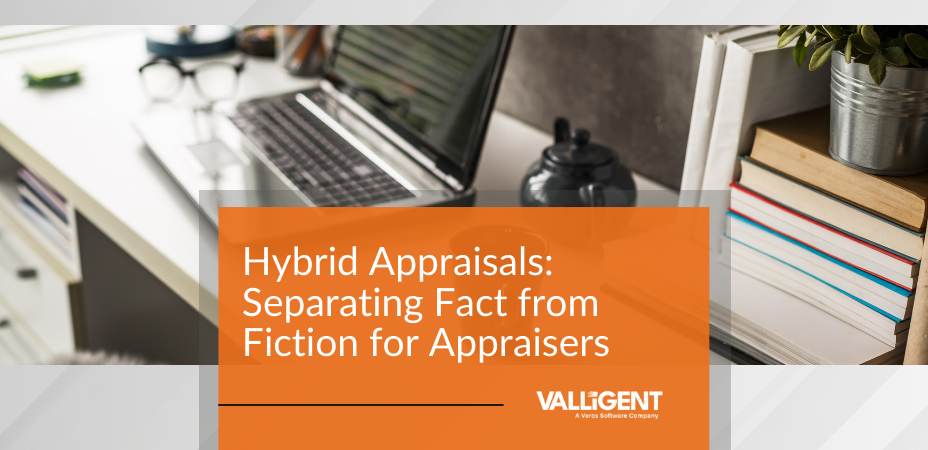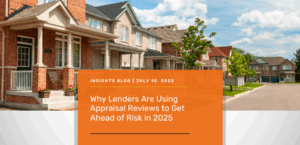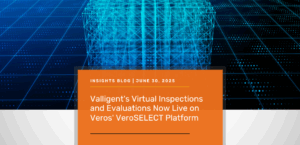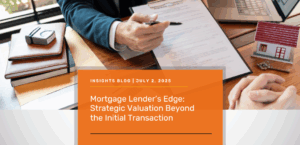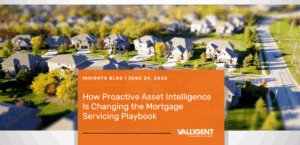Hybrid Appraisals (also referred to bifurcated appraisals) have been a hot topic in the housing finance industry lately, sparking both excitement and skepticism among appraisers. Especially with the Government-Sponsored Enterprise’s (GSEs) expanded eligibility of Hybrid Appraisals in their Selling Guides at the end of Q1 2025. Let’s cut through the noise and address some common misconceptions with a dose of reality, designed specifically for an appraiser’s professional perspective.
Fiction: Appraisers can’t trust the information provided by a data collection.
Fact: Let’s be clear: the concern around data integrity is valid. However, the GSEs have invested significant time and resources into pilot programs that demonstrate the reliability of professionally gathered subject property information provided by data collections for Hybrid Appraisals. These programs mandate that data collection be performed by trained and tested real estate professionals, which includes appraisers and appraiser trainees.
Think about it: these individuals are equipped with a standardized, app-guided methodology to capture over 150 data points, detailed photos, and floor plans. This isn’t a casual walkthrough; it’s a structured process designed to provide the robust information appraisers need to develop a credible opinion of value. The GSEs wouldn’t be endorsing this model if the data wasn’t held up under scrutiny.
Fiction: Appraisers don’t want to do Hybrid Appraisals.
Fact: While the traditional field appraisal holds its place, let’s acknowledge the practical benefits of hybrid options. Industry surveys consistently reveal a preference among appraisers for the efficiency these products offer.
Consider the time saved by eliminating scheduling hassles and travel. This translates directly to increased productivity and potentially higher volume, particularly during periods where traditional appraisal demand might dip. Reduced overhead costs like gas and vehicle maintenance also contribute to a healthier bottom line. Framing this as a strategic tool to manage workload and optimize efficiency resonates with the business-minded appraiser.
Fiction: Appraisers must use all the information in the data collection.
Fact: This misconception undermines the core of our profession. Uniform Standards of Professional Appraisal Practice (USPAP) guidelines clearly state that appraisers should consider all available property data sources. A data collection report is simply another property data source, but it provides up-to-date information on the inside of the property.
As professionals, appraisers retain the critical role of evaluating the reliability and relevance of all data sources, including the data collection. An appraiser’s expertise dictates what information is credible and ultimately informs the opinion of value. Hybrid Appraisals don’t relinquish an appraiser’s authority; they provide them with more information to exercise it.
Fiction: Appraisers are liable for the accuracy of the data collection report.
Fact: This is a crucial point for risk management. The specific limiting conditions and appraiser certification language within 1004H/70H and 1073/465H (Hybrid) highlight the appraiser did not physically inspect the property. This factor relieves the appraiser of any liability around the quality or completeness of the data collection report.
It clearly establishes the boundary of the appraiser’s responsibility, focusing on the analysis and valuation based on the provided data. The liability for the accuracy and completeness of the data collection rests with the entity that performed it.
In Conclusion
Hybrid Appraisals, when implemented correctly with trained professionals and robust data collection methods, offer a valuable evolution in our industry. They present opportunities for increased efficiency, workload management, and potentially new revenue streams. By understanding the facts and dispelling the fiction, appraisers can approach this evolving landscape with informed confidence, leveraging these tools to enhance their practice while upholding the highest standards of our profession.
Appraisers, we’re happy to connect with you! The world of valuations is changing, and we’re particularly interested in your thoughts on Hybrid Appraisals. What’s been your journey so far? We’re all ears! Reach out to Valligent – we’re looking forward to a friendly chat.
